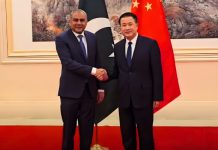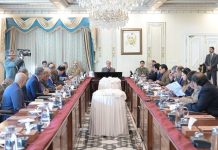Early November, Prime Minister Imran Khan left for a maiden visit to China. Pakistan was to reportedly receive a $6 billion economic package, during the visit, to reduce its dependence on the International Monetary Fund (IMF).
A week later, Finance Minister Asad Umar announced that Pakistan’s balance of payment crisis was effectively resolved. Of the “$12 billion financing gap, $6 billion have come from Saudi Arabia, and the rest has come from China,” Umar told the press. He further added that a high-level delegation will visit China to work out the modalities.
In an exclusive sit-down with media, Mr. Long Dingbin, the Chinese Consul-General (CCG) in Lahore said that “instead of hard cash, China plans to eventually provide multiple forms of bailout packages [to Pakistan], in the shape of phenomenal investments in fresh projects, broadening the area of inclusive cooperation and tapping new avenues of collaboration under the China-Pakistan Economic Corridor.” All of which, he added, would help “boost Pakistan’s economy and overcome its financial crunch.”
Mr. Dingbin spoke at China’s Consulate in Lahore.
 China, went on Mr. Dingbin, would never leave Pakistan in lurch and would channelize maximum resources to strengthen its languishing economy.
China, went on Mr. Dingbin, would never leave Pakistan in lurch and would channelize maximum resources to strengthen its languishing economy.
On asking, what exactly would this financial assistance look like, the Consul-General explained that during Prime Minister Khan’s recent visit to the country, the scope of investment was widened by inking 15 new agreements. These agreements included cooperation in politics, economics, people-to-people contacts and culture links, amongst others.
This communiqué is a guideline, he said, to comprehend new dimensions of strategic partnership and friendship between China and Pakistan.
When asked about Pakistan’s financial survivability and its increasing debt, Mr. Dingbin revealed that among the 22 projects under the CPEC, only four carried concessional loan. “The rest of 18 are investment-based and the CPEC projects do not increase Pakistan’s debt burden.” On the contrary, he said, these projects would unleash their economic benefits and turnaround Pakistan’s economy.
Sitting next to Mr. Dingbin was the deputy consul general, Peng Zhengwu. The interview was arranged a few days after terrorists attempted to attack China’s Consulate in Karachi.
Mr. Zhengwu praised the policemen who lost their lives saving the men and women working in the Consulate. He further hoped that the donations being collected for the martyred police officers would help their families. Mr. Dingbin gave 2,000 RMB and Mr. Zhengwu handed over a cheque of 1,000 RMB for the cause.
The Chinese diplomats are seriously considering to develop a “Permanent Donation Fund,” revealed Mr. Dingbin. Which “will not be limited to helping families of the security officials. It spectrum would be broadened to help out the deserving people of Pakistan.”
When asked what security measure has the Consulate taken after the terror attack, he said that they have developed a two-tier working mechanism that is in coordination with the Punjab government. “The mechanism features regular meetings of all law enforcement agencies to keep beefing up security standards.”



